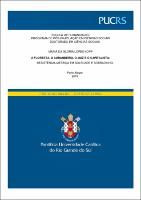| Share record |


|
Please use this identifier to cite or link to this item:
https://tede2.pucrs.br/tede2/handle/tede/9069| Document type: | Tese |
| Title: | A floresta, o curandeiro, o juiz e o capitalista : resistência mestiça em Soledade e Sobradinho |
| Author: | Kopp, Maria da Glória Lopes  |
| Advisor: | Jungblut, Airton Luiz |
| Abstract (native): | A presente tese evidencia o conceito de “comunidades anormais”, traduzido de teorias eugenistas europeias para a antropologia criminal brasileira, e sua longa utilização. Analisa-se especialmente o caso dos monges barbudos de Soledade e Sobradinho (1930-1938), ocorrido entre populações de diferentes procedências étnicas, assentadas na região de campos e florestas do Alto Rio Jacuí. Através de aspectos „biográficos‟ do Rio Grande do Sul são apontados os interesses comerciais pelos recursos naturais da região. As incursões de pesquisadores na América do Sul, facilitadas pela coroa portuguesa no século XIX, são vistas como levantamento de dados visando a exploração econômica. Com a instalação da República (1889), após a abolição legal da escravização (1888), a guerra promovida contra o arraial de Canudos, na Bahia, cristalizou a continuidade do modelo de intolerância estatal contra a organização popular. Nos anos 1930, interpretações literárias e sociológicas estabeleceram novas teses para esses movimentos sociais. Um olhar generoso que foi interrompido pela ditadura do Estado Novo (1937-1945). Nos anos 1950-1960, os estudos sobre essas organizações sociais religiosas ganharam fôlego com o conceito de “movimento messiânico”. Pesquisas dos anos 1970 incluíram abordagens como o “catolicismo rústico”, as tradições missionárias católicas, as matrizes da cosmogonia ameríndias e africanas, além da influência de grupos protestantes marginais e de minorias que migraram para o Brasil. No Rio Grande do Sul, o intenso fluxo imigratório e o estabelecimento de “colônias” em áreas florestais, especialmente de origem alemã e italiana, foi marcado pela perseguição ao movimento mucker (1868-1874). Nesse contexto de disputa, são examinadas fontes judiciais (1888-1940), oriundas de Soledade e Sobradinho, envolvendo poder político, opressões de gênero e faixa etária, diversidade religiosa, apontando as resistências dos subalternos. Frente às ideias de superioridade racial, associadas à ascensão do nazi-fascismo, o latifúndio militar de exploração do gado e da erva-mate, defrontou-se com „colônias mistas‟, de diferentes procedências étnicas e religiosas, que trouxeram uma renhida disputa por terras. O estado policial de Getúlio Vargas e a adesão do poder judiciário ao massacre dos dissidentes foram evidenciados com a atuação de uma geração de operadores do direito. |
| Abstract (english): | This thesis highlights the concept of "abnormal communities," translated from European eugenic theories to Brazilian criminal anthropology, and its prolonged use. We especially analyze the case of the bearded monks of Soledade and Sobradinho municipalities (1930-1938), which occurred among populations of different ethnic origins, based in the Alto Jacuí fields and forests region. Through "biographical" aspects of Rio Grande do Sul, this work point out the commercial interests for the natural resources of that region. Researchers' incursions into South America, facilitated by the Portuguese crown in the nineteenth century, are seen as a survey for economic exploitation. With the installation of the Republic (1889), after the legal abolition of slavery (1888), the war waged against the Canudos village in Bahia crystallized the continuity of the state intolerance model against popular organization. In the 1930s, literary and sociological interpretations established new theses for these social movements. These generous look were interrupted by the Estado Novo dictatorship (1937-1945). In the 1950s and 1960s, studies of these religious-social organizations gained momentum with the concept of the "messianic movement." Research from the 1970s included approaches such as "rustic Catholicism," Catholic missionary traditions, the Amerindian and African cosmogony matrices, and the influence of marginal Protestant and minority groups who migrated to Brazil. In Rio Grande do Sul, the intense immigration flow and the establishment of "colonies" in forest areas, especially of German and Italian origin, was marked by the persecution of the Mucker movement (1868-1874). In this context of dispute, this research examines judicial sources (1888-1940) from Soledade and Sobradinho, involving political power, gender and age oppressions, religious diversity, pointing out the resistance of the subordinates. Faced with the ideas of racial superiority, associated with the rise of Nazi-fascism, the military landowner of exploitation of cattle and yerba mate met 'mixed colonies' of different ethnic and religious backgrounds, which brought a close dispute over lands. This study presents pieces of evidence from the performance of a generation of legal operators that support the adhesion of Judiciary to the massacre of dissidents and that Getúlio Vargas governed through a police State. |
| Keywords: | Florestas do Alto Rio Jacuí Sociologia dos Movimentos Religiosos Nazi-Fascismo no Sul do Brasil Resistência Mestiça Rebeldia Feminina Upper Rio Jacuí Forests Sociology of Religious Movements Nazi-Fascism in Southern Brazil Mestizo Resistance Feminine Rebellion |
| CNPQ Knowledge Areas: | OUTROS::CIENCIAS SOCIAIS SOCIOLOGIA::OUTRAS SOCIOLOGIAS ESPECIFICAS |
| Language: | por |
| Country: | Brasil |
| Publisher: | Pontifícia Universidade Católica do Rio Grande do Sul |
| Institution Acronym: | PUCRS |
| Department: | Escola de Humanidades |
| Program: | Programa de Pós-Graduação em Ciências Sociais |
| Access type: | Acesso Aberto |
| Fulltext access restriction: | Trabalho não apresenta restrição para publicação |
| URI: | http://tede2.pucrs.br/tede2/handle/tede/9069 |
| Issue Date: | 30-Aug-2019 |
| Appears in Collections: | Programa de Pós-Graduação em Ciências Sociais |
Files in This Item:
| File | Description | Size | Format | |
|---|---|---|---|---|
| Maria_da_Glória_Lopes_Kopp_Tes.pdf | MARIA_DA_GLÓRIA_LOPES_KOPP_TES | 3.64 MB | Adobe PDF |  Download/Open Preview |
Items in DSpace are protected by copyright, with all rights reserved, unless otherwise indicated.




